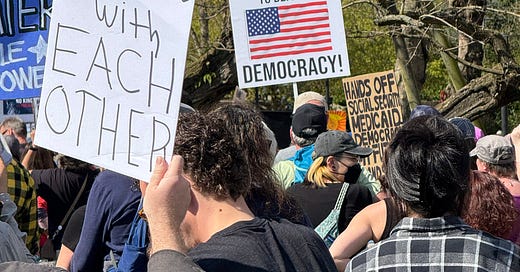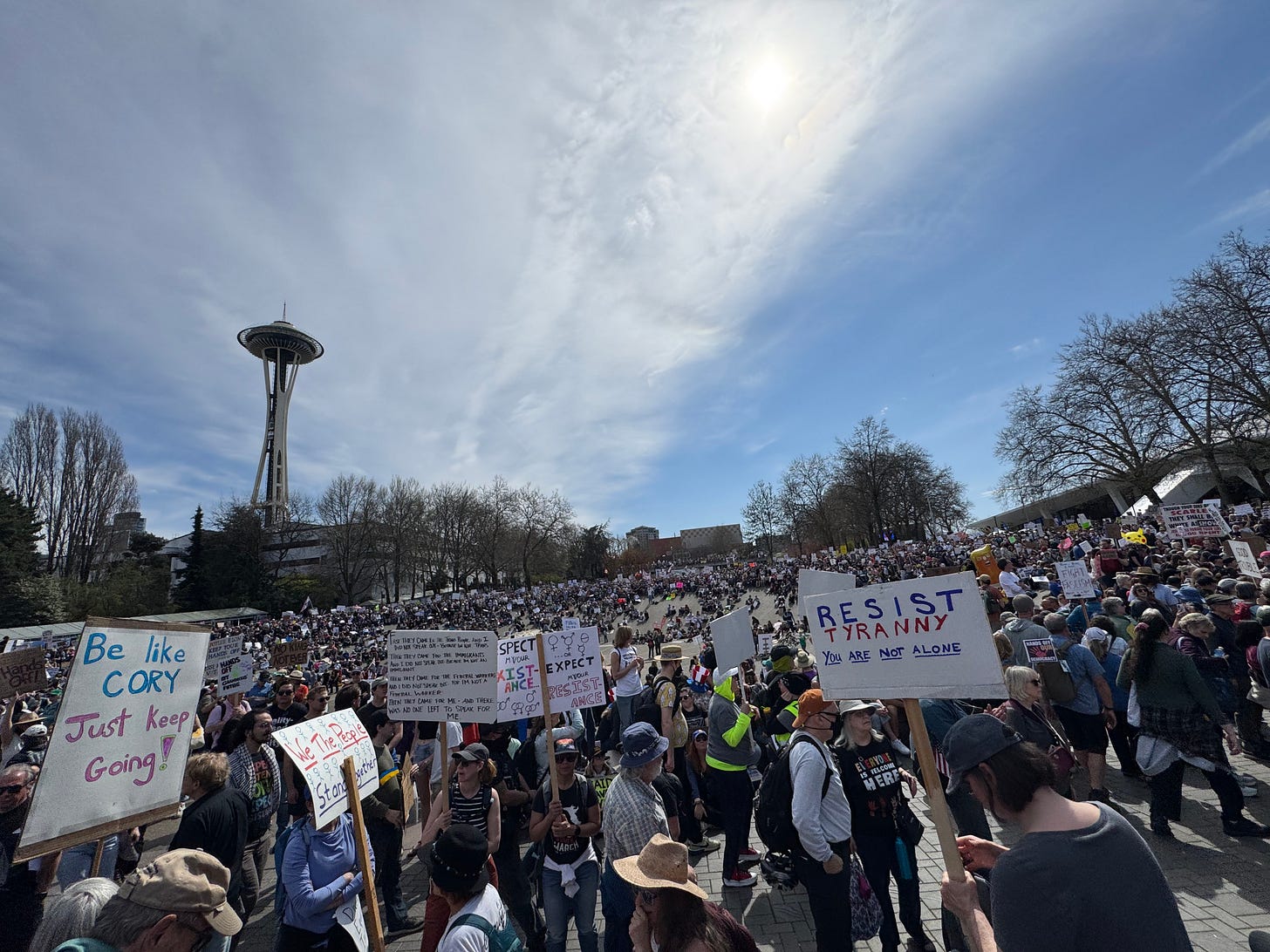“When the rulers of this age crucified the Lord of glory, they didn’t know what they were doing.” (1 Corinthians 2:8, paraphrase)
The Powers rarely recognize what they are doing until it is too late. Too often, neither do we. When the markets crash and your future feels like it is slipping away, it is hard to think about anything else. The fear is real, and so is the confusion. But if we are going to make sense of this moment, beyond the chaos, the trade wars, and the political theater, we need to step back and ask what is driving all of this. Why are these shocks happening now, and to what end? Something deeper is unfolding. Unless we learn to see it, we risk being swept along by forces we do not understand.
The Work of Naming
In my last post, I drew from William Stringfellow’s call to name and unmask the principalities, the spiritual powers that work through image, institution, and ideology. Today, we turn our discernment toward a particular power rapidly coalescing in our public life: Authoritarianism.
This is not just a political threat. It is a spiritual crisis.
Authoritarianism feeds on fear, thrives on disorientation, and preys on our longing for order, turning it into control. It masquerades as strength, cloaked in charisma and certainty, while undermining truth, eroding freedom, and distorting justice. If we fail to name it, we risk surrendering not just our rights, but our witness.
Yet when we see clearly, we can resist, not with panic or partisanship, but with the peaceable power of the crucified and risen Christ, who stands in defiance of every false lord.
This isn’t short, but neither is the crisis we face. If you’re ready to step beyond the noise and reflect deeply on the spiritual threat of authoritarianism and consider how the church is to respond, this post is for you.
Why This Matters Now
Theology without context becomes abstraction. And our current context is urgent.
The V-Dem Democracy Report 2025 finds that the U.S. now displays multiple traits of an electoral autocracy. Staffan I. Lindberg, founding director, warns: “If it continues like this, the United States will not score as a democracy when we release next year’s data.”
From freedom of expression to election integrity and institutional checks, the decline is real and accelerating.
The authoritarian index now places the U.S. at a severe threat level.
Authoritarianism rarely arrives with a bang. It advances through excuses, normalization, and fatigue. It disorients the people of God unless we are trained to see through its masks.
A Conversation I Can’t Forget
This conversation has been slightly altered to protect the identity of the person involved, but the content and emotional truth remain unchanged.
“Do you think Trump will stay in power until he dies?”
That was the question a friend of mine texted me in a recent conversation. He lives under an authoritarian regime and reached out with a tone of quiet urgency. I told him that such a thing would violate our Constitution, but added that, given the direction things are heading, I can’t rule anything out. “Why do you ask?” I responded.
He hesitated before replying, unsure if it was safe to speak freely. But when I told him he didn’t need to apologize and that I welcomed the question, something opened in him.
He told me about life where he lives: the impossibility of speaking out, the control of information, the reality that elections are rigged and opposition is crushed. People are expected to cheer obediently, even when afraid or suffering. Surveillance is constant. Access to the global internet is blocked. Most people, he said, have been deeply conditioned to accept it all.
Then he said something that has stayed with me.
“It’s like living in a prison.”
He had heard about Trump’s rhetoric, his self-comparisons to kings, his admiration for dictators, and he was alarmed. “We always looked to the United States,” he said, “as a place of freedom. A beacon of democracy.”
It was heartbreaking. And humbling. Because from his vantage point, the signs of danger are clear.
I told him that I, too, am deeply concerned. While authoritarianism doesn’t always arrive in the same way, it always follows similar patterns. I told him I’ve been raising my voice and calling others to resist before it’s too late.
At the end of the conversation, he expressed one final concern: “I hope this message won’t be seen by the cyber police. If it is, I could be arrested.”
And then he added:
“Long live democracy.”
A Prophetic Pattern
Many Americans still assume, “This could never happen here.” But history shows us that every society that slid into authoritarianism thought the same, until it did.
We are not exempt from history’s warnings. In fact, we are already tracing its familiar grooves.
The 7 Steps from Democracy to Dictatorship (From How to Lose a Country)
Create a populist identity claiming to speak for “the real people.”
Disrupt debate with conspiracy, rage, and spectacle.
Normalize the unthinkable.
Destroy trust in courts, media, and elections.
Seize legal systems for protection and revenge.
Define citizenship in narrow, exclusionary terms.
Reinforce power with law, propaganda, and force.
You can see the whole arc in a single line from Trump:
“I will be dictator on day one.”
It might sound absurd. That’s part of the playbook. As René Girard teaches, we imitate the desires of those we admire. Trump’s ongoing mimicry of autocrats, from Putin to Kim Jong-un, is not incidental. It is intentional, and it is contagious.
Spiritual Warfare, Not Spectacle
The temptation is to either numb ourselves or rage-scroll. But neither will prepare us for what’s ahead. We need theological clarity.
As Walter Wink reminds us, the Powers are not merely human systems but spiritual realities that are fallen and need redeeming. This is not a war “against flesh and blood,” but it is a war. And it demands what Stringfellow called a “biblical realism” rooted in resurrection hope.
“To live humanly in the Fall, is to live in resistance to death and in affirmation of life, in the midst of the powers of death.” – William Stringfellow
The Playbook and the Philosopher
Trump is not working alone. His backers have a vision and a plan. The vehicle is Project 2025 (Project Tracker). The philosopher? Curtis Yarvin, a self-proclaimed “neo-reactionary” who advocates replacing democracy with a techno-monarchy. His writings aren’t idle musings—they’re influencing the architecture of authoritarian power.
This is not just about one man’s return to office. It’s about an organized effort to consolidate control, dismantle democratic norms, and reimagine America as an autocracy run by unelected elites.
In an upcoming post, I’ll explore Yarvin’s vision in more depth, including how his ideas have quietly shaped the worldview of influential tech and political leaders.
The Strongman Playbook in Real Time
Journalist Kelli Hernandez recently traced how this strategy unfolds in real time, noting that Trump’s moves echo the classic authoritarian formula: crash the system, blame a flashy scapegoat, and consolidate power in the chaos. With Elon Musk’s public unraveling, she warns he may be cast as the perfect fall guy—fueling the very emergency Trump could then exploit.
Senator Chris Murphy, who has studied how democracies slide into dictatorship, has added a chilling new layer to this unfolding playbook: Trump’s tariffs are not economic policy; they are political weapons. Their purpose is not growth but control. By inflicting economic hardship across industries, Trump creates a landscape where business leaders must seek personalized relief and, in doing so, pledge loyalty. One by one, companies will face a choice: resist and suffer or submit and survive.
This isn't theoretical. As Murphy warns, it’s an intentional strategy to destroy independent power centers, industry, higher education, and local governments and replace them with a patronage system, where loyalty to Trump becomes the only real currency. This echoes the very tactics used by kings and despots throughout history, the kind our founders explicitly sought to prevent.
The World is Watching
This isn’t just internal. Authoritarian shifts in the U.S. are reverberating globally. Consider the signs:
Travel Warnings: Canada, Norway, Finland, Germany, Ireland, France, Denmark, The Netherlands, and the UK now caution their citizens about traveling to the U.S. A Canadian woman was arrested and stuck in a freezing cell without explanation.
Diplomatic Breaks: Canada’s prime minister recently declared that the 150-year relationship between Canada and the U.S. “as it was” has ended, a seismic shift from one of our closest allies. After recent tariffs, other world leaders react.
Militarized Rhetoric: Trump has refused to take the possibility of military action against Greenland off the table, an alarming signal of expansionist, strongman posturing.
Weimar+ Alliance: European leaders formed a new sovereignty bloc to resist U.S. influence.
UN Rebuke: The UN has issued human rights warnings regarding U.S. civil liberties.
Meanwhile, protests erupted across Europe against Trumpism and authoritarian resurgence. History may not repeat, but it rhymes.
Soft Coup in Progress
“On Friday, January 31st, 2025, Trump moved to complete the coup he began on January 6, 2021.” —Robert Hubbell, Today’s Edition Newsletter
We are living through a carefully staged auto-coup, an attempt to seize and consolidate power not with tanks but with legal maneuvers, institutional capture, and the slow unraveling of truth and trust. It is quiet, calculated, and clothed in legitimacy. And yet, it is no less dangerous. Now is the time to stay awake, to speak clearly, and to walk in the way of Jesus with courage.
“When important societal actors change behavior to avoid government wrath, we’ve crossed into authoritarianism.” —Steven Levitsky, author of How Democracies Die
Consider the evidence already unfolding:
Legal Capitulation
Major law firms are cowering before Trump. Paul Weiss, once known for championing justice, dismantled its equity initiatives after Trump revoked its security clearances. Now, they have gone further, offering pro bono legal work on his behalf. Other firms are beginning to fold as well. Law students with integrity have started to record how the various law firms are responding to fascist attacks.
Academic Intimidation
After Trump pulled $400 million in grants from Columbia and targeted Penn and Harvard, schools began curbing expression to avoid retaliation. Some leaders are pushing back, but many remain silent as academic freedom is systematically undermined.
Political Fear and Coercion
Rep. Eric Swalwell reported that GOP members fear not job loss, but violence against their families.
Military Restructuring
Senior military leaders, like Gen. C.Q. Brown and Admiral Lisa Franchetti, have been abruptly dismissed. Whistleblowers and former military leaders who served under Trump in his first term fear that ideological loyalty now outweighs constitutional duty.
Electoral Manipulation
In a recent move, Trump issued an executive order asserting control over the “time, place, and manner” of federal elections, an authority the Constitution explicitly grants to Congress and the states, not the president (see Article I, Section 4).
“This is how it happens, not with tanks, but with reshaped chains of command.”
—Breaking Point: America’s Military Crisis
A Holy Refusal Begins
The writing is on the wall. And now, the people are rising. Saturday, April 5th, marked the first major wave of protest since Trump returned to office. Hundreds of thousands, possibly millions, have poured into the streets in peaceful resistance, from big cities to small towns, across more than 1,300 demonstrations in all 50 states, with echoes rising in cities and streets around the world. What was hidden is being shouted from the housetops. A holy refusal is beginning to take shape.
But we cannot stop at marching. The moment calls us beyond initial mobilization. Now is the time for organizing, community-building, and sustained resistance. This is the work I’ll be exploring in the days ahead.
Not all who marched would name it this way, but whenever people rise to resist domination and protect the vulnerable, something holy is stirring.
Theological Stakes
Let me be clear: Democracy is not our god.
The church has never needed freedom to be faithful. In every age, she has borne her truest witness not from positions of power but from the margins, through courage, suffering, and costly love.
The danger of authoritarianism is not that it might persecute the church. It’s that it might seduce her into silence, complicity, or the worship of lesser lords.
Authoritarian regimes do not simply censor dissent. Over time, they can form a different kind of church that blesses control, fears the cross, and forgets its first love.
“Jesus is Lord” was not a slogan for safety. It was, and still is, a confession that can cost you your life.
We are not called to preserve comfort or power but to embody the cross: truthful, costly, and free.
Some bear this witness with their lives. Others, like a certain archbishop in El Salvador, bear it with their deaths.
That witness still speaks.
Hope for the Journey
If this feels heavy, it should. Many of you already see what’s unfolding; you’ve felt the grief, the outrage, the call to vigilance. Perhaps what’s been fragmented is now coming into focus.
This is not a moment for despair. It is a moment for faithful resistance, resistance shaped not by the methods of the world but by the way of Christ.
Even with its flaws, a functioning democracy tends to reflect the values of God’s kingdom far more than authoritarian regimes do. It creates space for truth-telling, protects the vulnerable (however imperfectly), and allows communities to organize for justice and repair. When democracy erodes, those who suffer first and most are the poor, the marginalized, and the already oppressed.
(N.T. Wright, Can Jesus be Lord of our Politics?)
That’s why those who follow Jesus bear a particular responsibility, not to preserve privilege but to defend dignity, not to seize power but to protect those most harmed when power is abused.
This is the very temptation Jesus faced in the wilderness: to receive the kingdoms of the world without the cross. But God’s reign never comes by domination; it comes by cruciform love.
“The light shines in the darkness, and the darkness has not overcome it.” —John 1:5
Looking Ahead
Faithful resistance doesn’t stop with naming the crisis; it deepens with discernment and embodied witness. In the coming weeks, I’ll be exploring what lies beneath the surface of our unraveling and how we might resist with clarity, courage, and love.
Unmasking the Spirit of the Age: In the Grip of Foust
A deeper dive into the currents beneath the chaos, engaging The Fourth Turning (Strauss and Howe), Phyllis Tickle’s The Great Emergence, and Oswald Spengler’s The Decline of the West. What if our moment is part of a haunting historical pattern? And what if the Spirit is still moving, even here?The Engine of Autocracy: Technocrats, Oligarchs, and the New Architecture of Control
Behind the strongman lies a system. This post will examine how technocracy and oligarchy are forging a new infrastructure of domination that calls for spiritual discernment and faithful resistance beyond left or right.A Faithful Witness to the Reign of God Amid the Powers of Authoritarianism and Oligarchy
Through the life and martyrdom of Óscar Romero, we’ll explore what it means to follow Jesus in the face of state violence and elite control. Romero offers us more than inspiration; he provides a vision of resistance rooted in the love of God and the dignity of the poor.
If this moment feels overwhelming, you’re not alone. But we are not without guidance. We are not without hope. The light still shines in the darkness, and we are called to bear witness to it.
We do not numb ourselves.
We do not withdraw.
We root deeper.
We rise together.
We resist - not to win, but to witness.








“The church has never needed freedom to be faithful. In every age, she has borne her truest witness not from positions of power but from the margins, through courage, suffering, and costly love.” Thanks, JR.
Grateful for the clarity and courage reflected here. Thank you, JR!